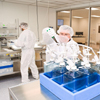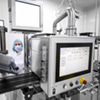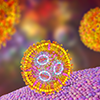Avantor® Biopharma Educational Material
Learn all you need to know on biopharma, its R&D and manufacturing processes and technologies advancing patient treatments and therapies.

Downstream Process Bottlenecks
A downstream bottleneck is any step that requires more time or resources than it “should.” Learn more about downstream process bottlenecks.

Filter Types in Pharmaceutical/Biopharma
The pharmaceutical industry relies on various types of filters to ensure product quality and patient safety.

Maximizing Efficiency with Single-Use Technology in Downstream Processing
Discover how single-use technology can revolutionize your downstream processing workflows. Find out how it maximizes efficiency, reduces costs and minimizes contamination risks.

An Overview of Protein Expression Systems
Protein expression refers to how proteins are synthesized, modified, and regulated in living organisms. Learn more about Protein Expression Systems in this overview.

Strategies for Efficient Recombinant Protein Expression
Recombinant protein expressions are essential in biotechnology and biomedical research. Recombinant proteins, which are proteins produced through genetic engineering techniques, have numerous applications, ranging from therapeutics to industrial enzymes.

The Role of Filtration in the Biopharmaceutical Industry
The Role of Filtration in the Biopharmaceutical Industry isfor removing contaminants from liquids, gases and air. Learn the role of Filtration in the Biopharmaceutical Industry.

Disruptions in the Development of Cell and Gene Therapies
Cell and gene therapies (known as CGTs) hold immense potential for highly effective treatments across various diseases. They offer innovative therapeutic solutions tailored to specific needs.

The Role of Filtration in the Biopharmaceutical Industry
Filtration holds immense importance in the biopharmaceutical industry, where it plays a crucial role in removing contaminants from desired products and ensuring their sterility.

An Overview of Proteomics
Proteomics is the study of proteins in a biological system that offers the required understanding of an organism’s structure and function compared to genomics.

mRNA Therapeutics Through Gene Modulation and Cancer Immunotherapy
Discover the latest breakthroughs in mRNA therapeutics, including vaccine development, gene therapy and cancer immunotherapy. Explore the future prospects and challenges in this cutting-edge field.

Advantages of Removing Downstream Bottlenecks
Removing downstream bottlenecks enhances efficiency by ensuring smooth workflow, reducing delays, and improving overall productivity while promoting faster delivery and customer satisfaction.

The Advantages of Single-Use Systems in Biopharmaceutical Manufacturing
Single-use systems have revolutionized biopharmaceutical manufacturing, offering numerous advantages over traditional stainless steel systems.

Vaccine Manufacturing Process
Vaccine manufacturing process entails cultivating the target pathogen, processing it into a safe form, and packaging it for distribution while adhering to rigorous quality standards.

Liquid Filtration for Pharmaceutical Manufacturing
Pharmaceutical manufacturing involves a crucial process known as liquid filtration, which aims to remove impurities and particles from liquids like water, buffers or solvents.

History of mRNA Vaccines
Messenger RNA (mRNA) vaccines gained widespread awareness during the COVID-19 pandemic when they were approved for use in humans.

What is Cell and Gene Therapy?
Cell and gene therapy are closely related fields that use biological materials or substances to treat diseases.

Cell and Gene Therapy Manufacturing and Commercialization
Cell and gene therapy manufacturing and commercialization are advancing rapidly due to the potential to improve how we treat various diseases and the outcomes of those treatments.

The Function of mRNA in Biopharma
Messenger RNA (mRNA) plays a critical role in gene expression, a process in which stored genetic information in DNA is used to create proteins.

The Development of mRNA Vaccine Technology: An Overview
The development of mRNA (Messenger Ribonucleic Acid) vaccine technology can be considered a medical breakthrough that has revolutionized science’s ability to develop measures to protect us from deadly diseases.

Lab Inventory Management Best Practices
Laboratory inventory management is important to ensure the smooth operation of any research facility.

How Technology Is Shaping the Future of Clinical Trials
Clinical trials are important for evaluating the safety and effectiveness of drugs, medical devices and treatments.

The Role of RNA in Protein Synthesis
Ribonucleic acid (RNA) plays a crucial role in protein synthesis. Protein synthesis occurs in two main stages: transcription and translation.

Decentralized Clinical Trials: An Overview
Decentralized Clinical Trials are important, as they can help patients participate in clinical trials from their homes or other locations.

What Are the 4 Phases of Clinical Trials?
Clinical trials are vital to drug development and involve new treatments tested rigorously to ensure their safety and efficacy.

What Is Protein Purification?
Protein purification is an important technique in biochemistry, molecular biology and biotechnology, as proteins play a vital role in various biological processes.

Upstream Processing Overview
Upstream processing is an important stage in bioprocessing that involves preparing and manipulating biological materials before subjecting them to downstream processing.

Monoclonal Antibody Manufacturing Processes
Discover the monoclonal antibody productions and manufacturing processes from cell culture to purification, characterization and quality control.

Monoclonal Antibodies: Understanding Their Production and Clinical Applications
Monoclonal antibodies (mAbs or Moabs) are a type of protein made in the lab. mAbs are used to treat diseases, including some kinds of cancer. Learn what monoclonal antibodies are and how they impact clinical applications.

An Introduction to Recombinant Proteins
Explore the science behind recombinant proteins — from what it is to the types of recombinant proteins — and learn how they are revolutionizing biotechnology and medicine.

Downstream Processing Overview
Downstream processing is the part of a bioprocess in which the product from the upstream process is isolated, purified and separated.

Strategies for Optimizing Downstream Processing
Downstream processing is vital for efficient and cost-effective production of biopharmaceuticals, industrial enzymes and other bio-based products.